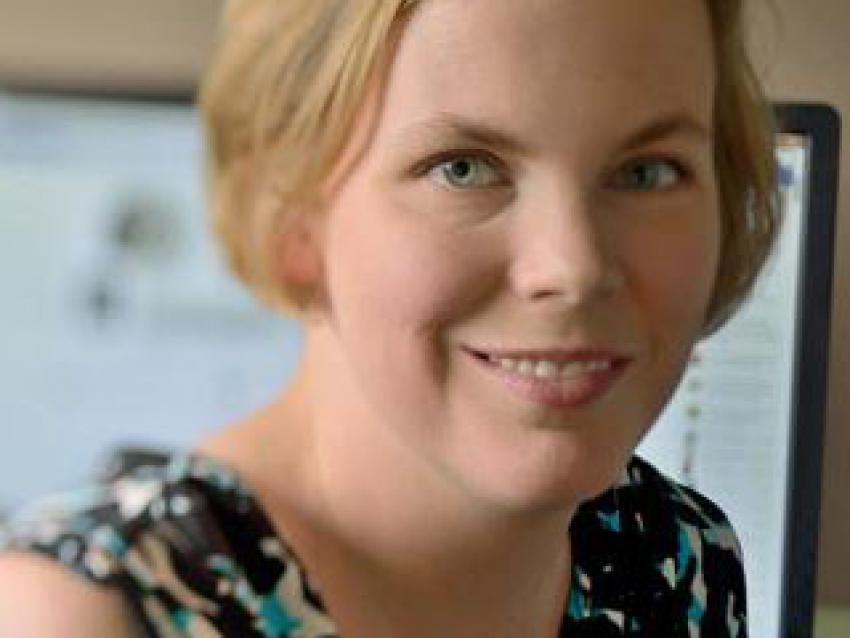
Quest for Knowledge
When Rebecca Dekker, PhD, RN, APRN, had her first child six years ago, she left the hospital puzzled by many aspects of the experience. Primarily, as a healthy young woman giving birth to a healthy baby, why had she been treated throughout her stay as though she were unwell?
“I felt like I was a heart patient, with all the rules applicable to a sick person,” says Dr. Dekker, who conducts cardiovascular research nursing at the University of Kentucky’s College of Nursing.
The result of her questions is evidencebasedbirth.com, a website/blog she created three years ago. What started out as a passion, though, has garnered a vast international following that includes everyday families and healthcare professionals who have similar questions and are interested in the science behind the answers.
“I get emails every day from physicians, nurses and midwives all over the world,” says Dr. Dekker, who has been invited to speak on the topic at professional conferences. “It is an interesting space where everyone comes together to learn about evidence-based maternity in the same spot.”
While she was in the hospital delivering her first child, Dr. Dekker could not understand why she wasn’t allowed to eat during labor, get out of bed, or spend time with her newborn after delivery. The interventions she’d undergone, which had led to complications, also left her with a lot of questions, all of which she wrote down afterward.
Not one to leave questions unanswered, especially when planning to have another child, Dr. Dekker used her spare time to research the reasoning behind each of the labor and delivery protocols she’d undergone and wondered about. She pored through the most updated research, looking for evidence that these were, indeed, the best practices.
“I always want to know why things are done the way they are today and the history behind them,” she said.
Armed with a lot more knowledge when she had her second child, Dr. Dekker was able to make more choices that allowed her to be part of the process.
“It was such an opposite experience,” she said about having her second child. “The first time, complications compromised my ability to take care of my baby; the second time I felt empowered.”
A seemingly small detail remains etched her mind. After she’d given birth to her first child, the baby was whisked away for observation for several hours. Dr. Dekker repeatedly asked the nurses to see her daughter. She said the nurses kept telling her, “not yet,” with one nurse explaining that she’d just had a bath. When she gave birth to her second child, who barely left her arms, Dr. Dekker asked when they would give him a bath, and the midwife told her: “He’s your baby; you can decide when to give him a bath.”
That completely different experience compelled to Dr. Dekker to start evidencebasedbirth.com so she could share what she had discovered in her own research.
Little did she know just how far the word, or words in this case, would travel. Her website has had 1.5 million page views over the past year, with visitors from almost every country in the world, with the exception of three.
“I started blogging what I had written for myself as a way to document my research, and the response was amazing,” Dr. Dekker said. “From the beginning it took off.”
She said she is riding the crest of the wave of evidence-based care, where patients, as a whole, are more engaged in their health care and want to know the evidence behind it.
“I am trying to get the research out from behind the paywall and make it available to the public at a level they can understand,” Dr. Dekker said. “This is a way to get the information out there for free.”
Assistant professor and colleague Kristen Ashford, PhD, RN, APRN, says sometimes people get set in their ways and practices and that Dr. Dekker is doing a huge service promoting the most current evidence-based practices.
“Rebecca is focused on empowering women with that information so they can take it to their providers and have a discussion about it,” Dr. Ashford says.
Professor and Associate Dean of Undergraduate Faculty Affairs Patricia Burkhart, PhD, RN, says Dr. Dekker brings personal experience to her blog, but more importantly, shares evidence-based expertise with consumers who are looking for an individualized approach to childbirth.
Dr. Dekker said she plans to continue her website and hopes to build a bridge from cardiology to obstetrics with research that has a foot in both, such as the propensity of heart disease to occur in women who have had gestational diabetes.
“We are fortunate to have Dr. Dekker as a College of Nursing faculty member who shares her passion and expertise, not only with the public, but with our UK nursing students,” Dr. Burkhart says.
